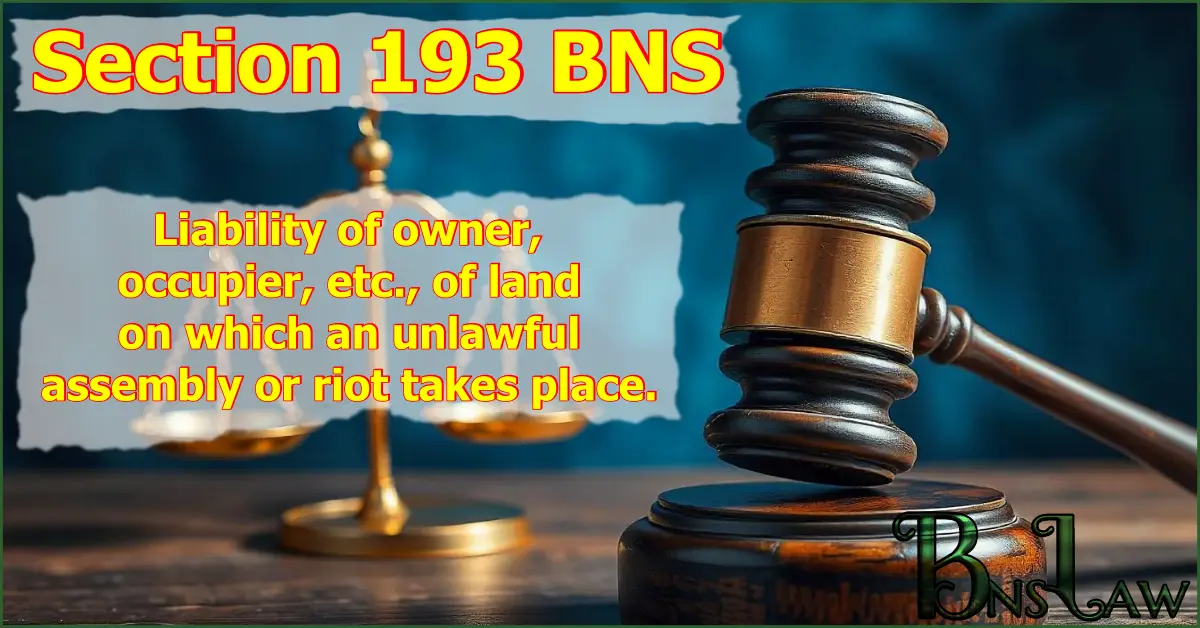Section 193 BNS | BNS 193
193(1) BNS
Whenever any unlawful assembly or riot takes place, the owner or occupier of the land upon which such unlawful assembly is held, or such riot is committed, and any person having or claiming an interest in such land, shall be punishable with fine not exceeding one thousand rupees, if he or his agent or manager, knowing that such offence is being or has been committed, or having reason to believe it is likely to be committed,
do not give the earliest notice thereof in his or their power to the officer in charge at the nearest police station, and do not, in the case of his or their having reason to believe that it was about to be committed, use all lawful means in his or their power to prevent it and, in the event of its taking place, do not use all lawful means in his or their power to disperse or suppress the riot or unlawful assembly.
193(2) BNS
Whenever a riot is committed for the benefit or on behalf of any person who is the owner or occupier of any land respecting which such riot takes place or who claims any interest in such land, or in the subject of any dispute which gave rise to the riot, or who has accepted or derived any benefit therefrom, such person shall be punishable with fine, if he or his agent or manager,
having reason to believe that such riot was likely to be committed or that the unlawful assembly by which such riot was committed was likely to be held, shall not respectively use all lawful means in his or their power to prevent such assembly or riot from taking place, and for suppressing and dispersing the same.
193(3) BNS
Whenever a riot is committed for the benefit or on behalf of any person who is the owner or occupier of any land respecting which such riot takes place, or who claims any interest in such land, or in the subject of any dispute which gave rise to the riot, or who has accepted or derived any benefit therefrom, the agent or manager of such person shall be punishable with fine,
if such agent or manager, having reason to believe that such riot was likely to be committed, or that the unlawful assembly by which such riot was committed was likely to be held, shall not use all lawful means in his power to prevent such riot or assembly from taking place and for suppressing and dispersing the same.
READ OTHER SECTIONS OF CHAPTER XI — OF OFFENCES AGAINST THE PUBLIC TRANQUILLITY
| Section No. | Section Title |
|---|---|
| 189 | Unlawful assembly. |
| 190 | Every member of unlawful assembly guilty of offence committed in prosecution of common object. |
| 191 | Rioting. |
| 192 | Wantonly giving provocation with intent to cause riot-if rioting be committed; if not committed. |
| 193 | Liability of owner, occupier, etc., of land on which an unlawful assembly or riot takes place. |
| 194 | Affray. |
| 195 | Assaulting or obstructing public servant when suppressing riot, etc. |
| 196 | Promoting enmity between different groups on grounds of religion, race, place of birth, residence, language, etc., and doing acts prejudicial to maintenance of harmony. |
| 197 | Imputations, assertions prejudicial to national integration. |
FAQs of BNS Section 193
-
193 BNS punishment and fine
Punishment and fine under Section 193 of the BNS—
193(1): Fine of 1,000 rupees.
193(2): Fine.
193(3): Fine. -
193 BNS cognizable or not
The offence under all sub-sections of Section 193 of the BNS is non-cognizable.
-
193 BNS bailable or not
The offence under all sub-sections of Section 193 of the BNS is bailable.
-
193 BNS trial court
Offence specified in all sub-sections of Section 193 of the BNS is triable by any Magistrate.
Important Points
- Cognizable Offences: These are offences where a police officer can arrest a person without a warrant.
- Non-Cognizable Offences: These are offences where a police officer cannot arrest a person without a warrant.
- Bailable Offences: These are offences where the accused can get bail from the police station itself. All bailable offences are listed in the First Schedule of the Bharatiya Nagarik Suraksha Sanhita (BNSS).
- Non-Bailable Offences: Offences in which bail is not granted directly from the police station but after hearing the case in the court, the judge decides when bail will be granted. All non-bailable offences are listed in the first schedule of the Bharatiya Nagarik Suraksha Sanhita (BNSS).
- In the above FAQ, “trial court” means the court that has jurisdiction to try the offence.
- In the above FAQ, the expression “Magistrate of the first class” and “Any Magistrate” does not include Executive Magistrates.
Read other Sections of the BNS
Reference Link: New Criminal Laws (BNS), Ministry of Home Affairs







